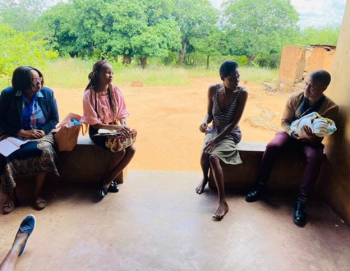
by Miriam Chadzingwa and Lispoh Rugaro, FACT Zimbabwe
 Case conferencing is a modern way of unifying multi-disciplinary professionals known to or working with a child in order to develop interventions that will more effectively address the child’s needs. Case conferencing is often used for more complicated cases after initial efforts have failed. This process is often used for children with high viral loads and more complicated cases in the SPACE for OVC program, being implemented by FACT ZIMBABWE with support from the U.S. President's Emergency Plan for AIDS Relief (PEPFAR) through the United States Agency for International Development (USAID). SPACE for OVC works in high HIV-burden districts, to help communities and local institutions provide a comprehensive set of services to improve the health, nutrition, and psycho-social well-being of HIV-affected and infected children.
Case conferencing is a modern way of unifying multi-disciplinary professionals known to or working with a child in order to develop interventions that will more effectively address the child’s needs. Case conferencing is often used for more complicated cases after initial efforts have failed. This process is often used for children with high viral loads and more complicated cases in the SPACE for OVC program, being implemented by FACT ZIMBABWE with support from the U.S. President's Emergency Plan for AIDS Relief (PEPFAR) through the United States Agency for International Development (USAID). SPACE for OVC works in high HIV-burden districts, to help communities and local institutions provide a comprehensive set of services to improve the health, nutrition, and psycho-social well-being of HIV-affected and infected children.
One such case that required case conferencing involved 14-year-old Nyasha (name changed to protect identity), who is living with HIV and was admitted to the hospital due to infections. Her mother is also living with HIV and clinically was not well, having been diagnosed with depression and a denial of HIV infection. A case conference was conducted amongst clinical and community-based partners, namely Zimbabwe Health Interventions (ZHI), Africaid, the Department of Social Development, the Ministry of Health and Child Care, Mercy Corps and Family AIDS Caring Trust Health and Case Management Officers. The outcome of the case conference necessitated provision of adherence counselling, viral load literacy, psychosocial support, cognitive behavioural therapy, child peer-to-peer counselling, food security in the form of cash transfer and safe shelter. Nyasha’s viral load is still high but within 3 months it has been greatly reduced. Her mother’s viral load is suppressed and she has re-joined an Internal Savings and Lending group paying a monthly subscription of $5USD. As a result of participating in the group, she has started a broiler project with 50 broiler chicks which have now reached maturity. Nyasha is also a FACT program participant receiving educational support assistance, and has participated in HIV/GBV violence prevention training through the ‘’No Means No’ program.
The progress made by this household is best described by Nyasha’s mother who says: “Sister I have fully accepted my situation, Nyasha’s viral load is going to be suppressed and I see myself with 100 broilers in the next 6 months. This will help me to pay fees for Nyasha and meet medical bills.”
